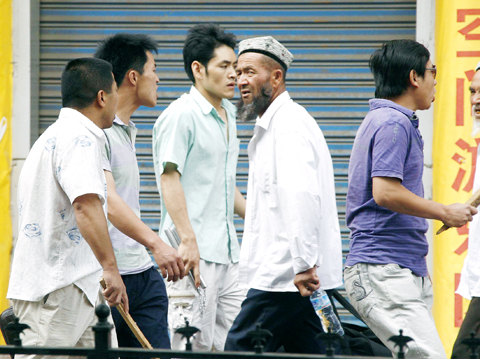Police killed 400 Uighurs in the capital of China’s Xinjiang region during ethnic unrest there, exiled Uighur leader Rebiya Kadeer wrote in yesterday’s Wall Street Journal Asia, while AFP reporters witnessed two attacks on Uighur men yesterday.
Kadeer said Uighur sources within “East Turkestan,” the name Uighurs use for the northwest region, had told her 400 Uighurs had died “as a result of police shootings and beatings” in Urumqi since violence erupted there on Sunday.
The president of the World Uighur Congress said that unrest was spreading across the region and that unconfirmed reports also indicated more than 100 Uighurs had been killed in Kashgar, another major city in Xinjiang.

PHOTO: EPA
Chinese authorities have said 156 people died in Sunday’s violence in Urumqi. They have not made clear how many of the victims were Han Chinese and how many were Uighur, or how they died.
China has blamed Kadeer for instigating the violence, which she strongly denies.
In the Wall Street Journal Asia, Kadeer expressed concerns about the security sweep that Chinese authorities have said has already led to the arrests of 1,434 suspects.
“Uighurs have contacted me to report that the Chinese authorities are in the process of conducting a house-to-house search of Uighur homes and are arresting male Uighurs,” she wrote. “They say that Uighurs are afraid to walk the streets in the capital of their homeland.”
Sunday’s protest by Muslim Uighurs was sparked by a brawl between Uighurs and Han Chinese workers at a toy factory in southern China last month, which left two Uighurs dead, according to official figures.
Kadeer said the protest against the authorities’ response to the initial incident was peaceful and should not have descended into violence.
“I unequivocally condemn the use of violence by Uighurs during the demonstration as much as I do China’s use of excessive force against protestors,” she wrote.
ATTACKS
Meanwhile, AFP reporters witnessed two attacks yesterday.
Three Muslim Uighur men heard the chants of a baying mob and began running for their lives.
“Get them! Strike! Strike! Strike!” dozens of Han Chinese screamed as they began chasing the trio.
Two of the men escaped.
One was not so lucky and for 30 terrifying seconds he lay on the ground as about six people kicked him repeatedly, while dozens of Han Chinese looked on yelling encouragement to the attackers.
Police soon moved in to end the attack, but not before one woman with permed hair who looked in her 30s managed to kick the helpless man.
As police pushed the crowd away but made no attempt to arrest the assailants, the Uighur man lay on the ground with his face bloodied and in visible agony.
The attack was one of two by Han Chinese against Uighur men in China’s restive Urumqi city that AFP reporters witnessed yesterday.
The mob assaults came despite a massive show of force by Chinese military and police in Urumqi following riots on Sunday.

‘EYE FOR AN EYE’: Two of the men were shot by a male relative of the victims, whose families turned down the opportunity to offer them amnesty, the Supreme Court said Four men were yesterday publicly executed in Afghanistan, the Supreme Court said, the highest number of executions to be carried out in one day since the Taliban’s return to power. The executions in three separate provinces brought to 10 the number of men publicly put to death since 2021, according to an Agence France-Presse tally. Public executions were common during the Taliban’s first rule from 1996 to 2001, with most of them carried out publicly in sports stadiums. Two men were shot around six or seven times by a male relative of the victims in front of spectators in Qala-i-Naw, the center

Incumbent Ecuadoran President Daniel Noboa on Sunday claimed a runaway victory in the nation’s presidential election, after voters endorsed the young leader’s “iron fist” approach to rampant cartel violence. With more than 90 percent of the votes counted, the National Election Council said Noboa had an unassailable 12-point lead over his leftist rival Luisa Gonzalez. Official results showed Noboa with 56 percent of the vote, against Gonzalez’s 44 percent — a far bigger winning margin than expected after a virtual tie in the first round. Speaking to jubilant supporters in his hometown of Olon, the 37-year-old president claimed a “historic victory.” “A huge hug

Canadian Prime Minister Mark Carney is leaning into his banking background as his country fights a trade war with the US, but his financial ties have also made him a target for conspiracy theories. Incorporating tropes familiar to followers of the far-right QAnon movement, conspiratorial social media posts about the Liberal leader have surged ahead of the country’s April 28 election. Posts range from false claims he recited a “satanic chant” at a campaign event to artificial intelligence (AI)-generated images of him in a pool with convicted sex offender Jeffrey Epstein. “He’s the ideal person to be targeted here, for sure, due to

DISPUTE: Beijing seeks global support against Trump’s tariffs, but many governments remain hesitant to align, including India, ASEAN countries and Australia China is reaching out to other nations as the US layers on more tariffs, in what appears to be an attempt by Beijing to form a united front to compel Washington to retreat. Days into the effort, it is meeting only partial success from countries unwilling to ally with the main target of US President Donald Trump’s trade war. Facing the cratering of global markets, Trump on Wednesday backed off his tariffs on most nations for 90 days, saying countries were lining up to negotiate more favorable conditions. China has refused to seek talks, saying the US was insincere and that it